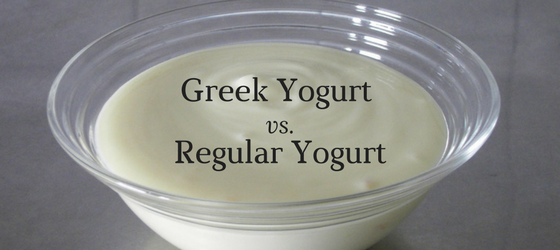Nutritionally speaking, yogurt is one of my favorite foods since it is a good source of protein and calcium, and most of my clients like it. I often suggest it as a breakfast food, because a lot of people have a hard time getting enough protein in the morning. Also, most people are open to eating yogurt, over other high protein foods like chicken or fish, for breakfast — and I don’t blame them!
Before I go further I need to point out that I suggest plain yogurt over the flavored yogurts. This can be a stumbling block for some, because plain yogurt is just too tart for them. However, the amount of added sugars in flavored yogurt can be in the tablespoons. One popular brand contains 20 – 40 grams of sugar per cup of yogurt. That is 5 – 10 teaspoons of sugar! Yogurt will have some natural sugars in the form of lactose. However, for the most part, the natural sugars don’t concern me. But I am concerned about the added sugars — so be a label reader! I will give you some tips at the end on how to add some sweetness (without all the sugar grams) to plain yogurt.
Greek yogurt hit the American shelves several years ago and has taken off in popularity. It is strained, meaning the whey liquid is strained off of it which gives it a thick texture and somewhat less tartness, which people tend to like. Before there was Greek yogurt, there was regular plain yogurt. Remember it? It is still there if you look for it at your local grocer, hiding behind all the Greek yogurt hogging the shelf space. All kidding aside, I thought it would be good to discuss the nutritional differences between these two types of yogurt. After reading this, you might just want to revisit that plain old yogurt.
For this examination, I choose a nationally recognized brand, Wallaby, that would be available to most people at their local grocer. Not all brands offer both Greek style and regular plain yogurt, so that was another criteria I looked for. I also looked for a brand that offered organic products, as buying organic is important for health and the environment. Let’s take a look at some of the main nutritional differences.
Nutrition Facts – Organic Greek Low-Fat Plain Yogurt – Wallaby Brand
| Serving Size | 1 cup (225g) |
| Amount Per Serving | |
| Calories 170 | Fat Cal 40 |
| % Daily Value* | |
| Total Fat 4.5g | 7% |
| Sat Fat 3g | 15% |
| Trans Fat 0g | |
| Cholesterol 20mg | 7% |
| Sodium 130mg | 5% |
| Total Carb 10g | 3% |
| Dietary Fiber 0g | 0% |
| Sugars 6g | |
| Protein 23g | 46% |
| Vitamin A | 2% |
| Vitamin C | 0% |
| Calcium | 25% |
| Iron | 0% |
* The Percent Daily Values are based on
a 2,000 calorie diet.
Nutrition Facts – Organic Plain Low-fat Yogurt – Wallaby Brand
| Serving Size | 1 Cup (225g) |
| Amount Per Serving | |
| Calories 140 | Calories from Fat 35 |
| % Daily Value* | |
| Total Fat 4g | 6% |
| Saturated Fat 2.5g | 13% |
| Trans Fat 0g | |
| Cholesterol 25mg | 8% |
| Sodium 125mg | 5% |
| Total Carb 15g | 5% |
| Dietary Fiber 0g | 0% |
| Sugars 9g | |
| Protein 11g | |
| Vitamin A | 4% |
| Vitamin C | 0% |
| Calcium | 40% |
| Iron | 8% |
* The Percent Daily Values are based on
a 2,000 calorie diet.
Calories: Greek yogurt has more calories than regular plain yogurt. However, at 30 additional calories per cup, it really isn’t that many more calories. If in fact you are trying to reduce your calories, then I might suggest going with a non-fat yogurt (130 calories) over a full-fat yogurt (220 calories), which will have more of an impact on calorie count. Low-fat Greek yogurt comes in at 170 calories, a nice in-between.
Protein: Because Greek yogurt is strained, it ends up higher in protein than regular plain yogurt. In fact, Greek yogurt has over twice the grams of protein. This can vary from brand to brand, so don’t assume just because a yogurt is labeled Greek yogurt, that is will be higher in protein, or vice versa. However, this is often the case. If you struggle to get enough protein in your diet, then eating Greek yogurt can be an easy way to up your protein. It is especially helpful to those who are vegetarians, or those who eat less poultry or red meat. As you can see, one cup of Greek yogurt yields 23 grams of protein. Greek yogurt is a definite winner in the protein department!
Sugar: The sugar in either plain Greek yogurt or regular yogurt comes from natural sugar called lactose. Greek yogurt has 6 grams per cup, whereas the regular plain yogurt has 9 grams per cup. I don’t consider a difference of 3 grams, which is less than a teaspoon of sugar, a significant amount. However, if you are managing your blood sugar and trying to reduce even natural sugars, then going for the Greek yogurt is definitely better. More protein, and less sugar is generally better for both blood sugar and energy levels, so Greek yogurt wins here.
Calcium: So you might be asking, why should you choose regular plain yogurt? Well, it wins in the calcium department hands down. One cup of regular plain yogurt provides 40% of the daily calcium need, whereas Greek yogurt provides 25%, which is still good. If you don’t take calcium supplements, and are trying to meet your calcium needs through diet alone, then opting for regular plain yogurt may be something to consider. This is especially important for menopausal women who are most at risk for losing bone mass.
Probiotics: When the whey is strained out to make Greek yogurt, some of the good bacteria, aka probiotics, are lost right along with the calcium. So regular plain yogurt wins in the probiotic division as well. Eating foods rich in probiotics is a essential to support the gut microbiome. I recommend trying to eat a food high in good bacteria on a daily basis.
To take the tart edge off plain yogurt, try mixing it with fresh fruit. This provides a natural source of sugar as well as fiber and phytonutrients. You can also try sprinkling it with xylitol, which is a sugar alcohol that is good for you, and has a very low glycemic index, and half the calories as sugar.
Recommended calcium intake for adults up to age 50 is 1000 mg per day, and 1,200 mg per day for those over 50. This intake can be tough for individuals to reach from food alone. In fact, data from a national study, NHANES 2009 – 2010, found that 42% of Americans did not meet their Estimated Average Requirements for calcium as recommended by the Institute of Medicine. If you wish to augment your diet with a good calcium supplement so you might reach your calcium needs and provide other bone supporting nutrients like magnesium, vitamin D, boron, and vitamin K, then I might suggest Osteoforce Supreme. If you are just looking for a more simple calcium supplement, then a cal/mag like Cal/Mag 2:1 should do the trick.






